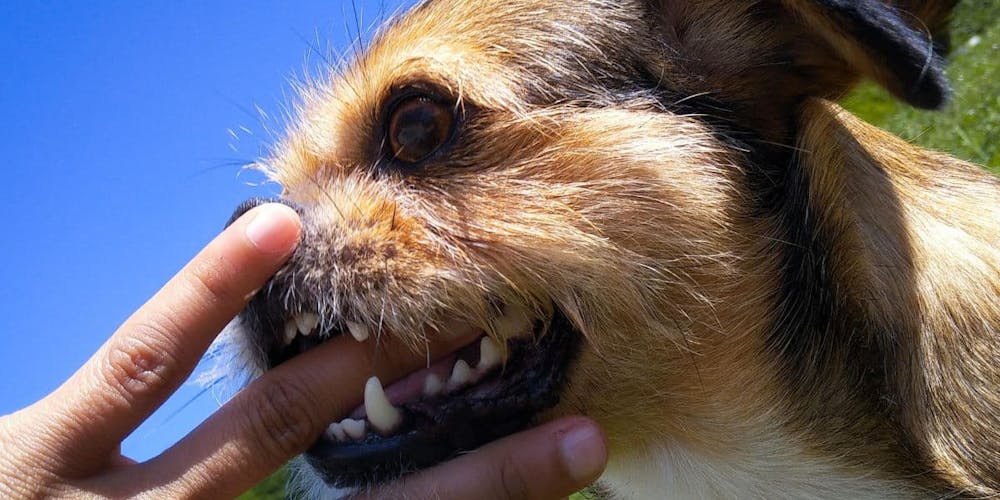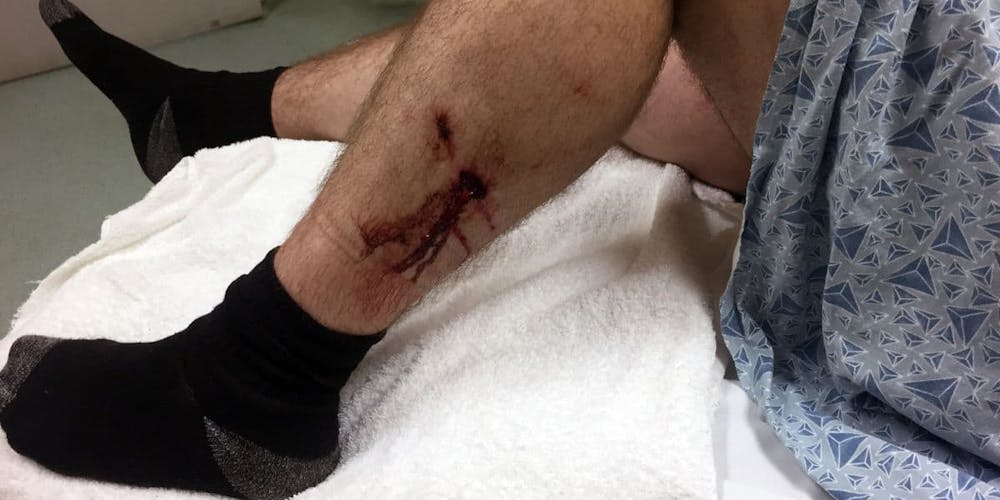
We don’t know how long-ago humans and dogs first crossed each other’s paths. But we do know that since then, dogs have become our guardians, our workers, and our friends. Yet what if you’re walking down the street, and a dog that seems friendly suddenly lunges and bites deep into your arm? Hopefully, the dog’s owner is there to help stop the attack as you try to protect yourself. But what should you do next?
Along with addressing the wound, get the name and contact information of the dog’s owner. You’ll also want their insurance information if they have it. Minor dog bites might be treated by washing the bitten area, using an anti-bacterial cream, and wrapping it in sterile bandages. Signs of infection like red streaks and swelling mean you’ll need to see a doctor immediately. Serious dog bites will require emergency room care, including vaccinations for any diseases the dog might have. Once the wound is treated, you also need to consider how to pursue a claim for damages.
Washington State follows the standard of strict liability as defined in RCW Section 16.08.040. This means it doesn’t matter whether the dog already bit someone, or the owner knew they were vicious. A bite victim doesn’t need to prove the bite was caused by negligence of the owner. If a dog bites you, the owner is automatically responsible and is liable for your damages.

The size or breed of dog doesn’t matter either. “If you have a small dog that runs around biting peoples’ fingers off, you’re liable,” says attorney Andrew Kim. “Some people rely on their dog not doing very much damage, but that’s not a good defense at all.”
This law also applies when a dog attacks or kills another animal in public without provocation. It should be noted that strict liability normally only applies to bites, however. For instances if a dog runs up to someone and knocks them over, rules of negligence may come into play. There are also a few other exceptions to the law.
Trespassing & Provocation
The two largest exceptions to strict liability are trespassing and provocation. Someone who trespasses on private property and is bitten by the owner’s dog can’t make a claim. Being on public land or having an owner’s permission to be on their property isn’t an absolute defense either. If you provoke the dog in any way, it’s likely any injury claim you make will be rejected. Additionally, if a police dog bites you while it’s on duty, you can’t file a claim against the police. Liability in general is an even more complicated question when children are involved.
In Washington State, no child under age six can be held negligent for any reason. Past age six, courts will likely judge their actions against a standard of what a reasonable, intelligent child of the same age would do. So, if they take the dog for a walk and it bites someone, they and the owner can be held liable. It won’t matter if they didn’t have permission, or the dog was too strong to control. Strict liability would still apply against the owner. What then must owners do to make sure their dog never bites someone?
A dog’s owner must keep them confined or contained so that they can’t get out in public and bite someone. This means putting a fence around their yard or keeping them in an enclosure so they can’t escape. Additionally, most Washington municipalities require dogs be on leash when out in public. They should only be let off leash at designated areas like dog parks. Even in those places, the owner should try to stay as close to the dog as possible. Additionally, there are other things an owner can do to reduce the risk of an attack to the public that aren’t legally required.
Proper socialization is key to any dog’s wellbeing. By regularly exposing them to other dogs and humans, most can become less aggressive. Additionally, an owner needs to keep small children away from a dog that’s sleeping or eating. Owners can watch their dog’s body language for warning signs their dog is anxious or angry and might lash out. It’s important that an owner understand their dog’s behavior, as it’s relevant once a bite occurs.
One Bite Rule
Some states follow what’s known as the one-bite rule. This means that if a dog’s never bitten someone and wasn’t aggressive before, the owner isn’t liable for that first bite. This can make it more difficult for victims to obtain compensation for their injuries. This doesn’t apply in Washington – because of our strict liability statute, the owner is liable. These laws don’t just apply to the dog’s owner. Anyone harboring the dog or keeping it for an extended period can be liable as well if it bites someone. A dog’s behavior is also relevant as to whether it is considered a “potentially dangerous” or “dangerous” dog.
In Washington State, a dog being potentially dangerous or dangerous is defined by law. Potentially dangerous dogs are ones that have chased or menaced someone in public, or are known to have aggressive, violent tendencies. Potentially dangerous also applies to dogs that have bitten someone or attacked a domestic animal, regardless of where it happened.
A dog is considered dangerous, however, if it’s severely injured a human or killed a domestic animal in public. This applies to a dog whose owner has been warned, formally or not, that the dog has a pattern of violent behavior. Owners of dangerous dogs must muzzle and chain them when in public. They must also post warnings on their property that a dangerous dog is present.
The law also applies to anyone handling a dangerous dog temporarily. “If a family member walks your dog and is aware that the dog is a dangerous dog, and if the family member fails to do the things required for handling a dangerous dog, then the family member may be liable as well as the owner,” attorney Andrew Kim explains. Whether or not a dog is considered dangerous can be especially relevant when a dog is menacing livestock.
Livestock and dog attacks
In Washington State, if a livestock owner comes upon a dog attacking their animals, they can kill it immediately. Livestock killed by a dog often must be reported to the sheriff. At that point they, or a deputy, may need to remove the dog or kill it if necessary. This rule applies to pets as well as livestock. If a pet owner sees their animal being attacked on their property, they can kill the attacking dog. Whatever the dog attacks, filing a claim against any insurance the dog owner may have is the likely next step.
Dog bite claims will most often be handled through the owner’s home or rental insurance. If their policy doesn’t include coverage for dog attacks, or if there’s no insurance, the owner would need to be sued directly. Additionally, if they have insurance but the damages exceed their coverage, the dog owner is responsible for the difference. You should also be ready for their insurance to try to offer a low payment to settle your claim. When that happens, you’ll want to have a good dog bite attorney working with you. And if the owner is a renter or tenant, it might be possible to also pursue a claim against their landlord.

Landlord Responsibilities
Generally speaking, landlords aren’t responsible when a tenant’s dog attacks a human or animal on their property. However, landlords are required to:
- Enforce policies that limit the size and breed of dog tenants can have
- Take action to remove from their property dogs they know are dangerous
- Maintain all fences and gates so dogs can’t escape the property and endanger someone in public
Not doing these things opens landlords to liability claims, but they must have a reasonable amount of time to act. Say they found out about a dangerous dog, and an hour later it bites someone on their property. They probably wouldn’t be held liable as that’s not enough time for them to do anything. But whether it’s against owner or landlord, what information do you need to file a claim with insurance?
You absolutely must get the owner’s home or rental insurance information. Sometimes you might need to threaten a lawsuit to get them to provide it. You must also report the incident to the local animal control office and local law enforcement. This is so that if the attack was severe enough, there’s an official record of your bite.
Take photos and video of the bite area as well as the location it happened. You must also speak to any witnesses to get their contact information, so that formal witness statements can be obtained later. Any video camera footage you get can be some of the strongest evidence possible to support your case. Whatever information you gather, you will also need to know what damages you can recover.

Damages You Can Recover
The most obvious damages you can recover are economic. This isn’t just medical bills – it includes:
- Transportation expenses to and from medical appointments
- Lost wages
- Damaged personal property (such as torn clothing)
- Modifications to your home (like putting up a safety fence around your yard)
- Cosmetic surgery for scarring from the bite
- The pain and suffering you went through
- Loss of earning potential if the bite resulted in a disability
You also shouldn’t discount any psychological trauma, short or long-term, the bite caused. “I think dog bites are often minimized in terms of the trauma they cause, and how they affect someone’s life,” notes attorney Andrew Kim. “For someone bitten by a dog, or by a large, aggressive one specifically, they may develop a phobia of dogs that impacts whenever they even go for a walk around the neighborhood and see any dogs.”
This kind of trauma requires medical documentation and therapy records, but with effort can be compensated. It may be possible to collect additional punitive damages if the owner was aware their dog was dangerous but did nothing. And while understanding damages available to you is key, it’s also important to know how to strengthen your claim.
You’ll need to seek regular medical care and keep all your appointments. Your injuries need to be documented. Without medical care even an experienced dog bite attorney can have difficulty obtaining a settlement. “The passage of time might make it difficult compared to car accidents,” attorney Kim explains,” where people know to get treatment immediately and to get follow-up care.”
Dog Bite Lawyer
Additionally, hiring a dog bite lawyer is one of the best ways to strengthen your case. You’ll need to work beside them in gathering supporting information and maintain active contact with them. A dog bite attorney can handle contact with witnesses and the dog’s owner if you aren’t comfortable talking to them. Doing so can be difficult, especially if it’s someone you’re close to. Your bodily injury attorney can make it clear that a claim against their insurance won’t affect what happens to their dog. You can focus on your own recovery and needs by hiring an attorney. They will use their knowledge and experience to get you the settlement you deserve. But if a settlement, unfortunately, can’t be reached, that is where litigation comes in.
Sometimes dog bite cases can be resolved through mediation or arbitration. This process involves a neutral third party rendering a decision based on the facts of the case. If a trial can’t be avoided, an experienced trial lawyer is necessary to help attain an appropriate verdict. They know the rules and procedures of the courts and whether a potential juror may be unsympathetic to you. They know how to tell the jury a compelling story that links your injuries and your pain and suffering to the dog bite. Trials can be a long and difficult process to go through. That’s why you’ll want the best personal injury trial lawyer possible at your side so you can get the settlement you’re owed.
Dog bites can be a deeply traumatic experience. They can color your relationship not just with other dogs but with their owners as well. Trying to deal with the dog’s owner and insurance companies while your injuries heal can be a nightmare. We here at Park Chenaur and Associates have many years of experience with dog bite cases and know how to get our clients the compensation they deserve. Recovering from a dog bite can be a long and painful process, and we will do everything we can to help you on that journey to justice.












